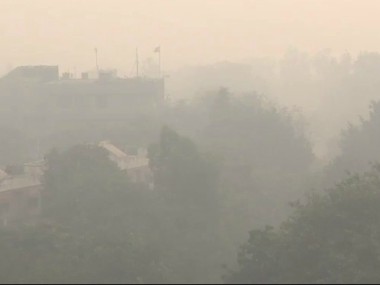New Delhi: Delhi recorded its worst air quality of the year the morning after Diwali as the pollution level entered the “severe-plus emergency” category due to rampant bursting of toxic firecrackers, authorities said on Thursday. The overall air quality index jumped to 574, which falls in the “severe-plus emergency” category, according to data by the Centre-run SAFAR (System of Air Quality and Weather Forecasting And Research). The sharp spike in pollution is caused by rampant burning of firecrackers that has led to the formation of a smoky layer across the national capital and drastically reduced visibility, the authorities said. The SAFAR had warned that even if partial toxic firecrackers as compare to last year were burnt, then the air quality would fall in the severe category. [caption id=“attachment_5505891” align=“alignleft” width=“380”] The day after Diwali, Delhi’s air quality deteriorated to the severe’plus category. ANI[/caption] An Air Quality Index (AQI) between 0 and 50 is considered “good”, 51 and 100 “satisfactory”, 101 and 200 “moderate”, 201 and 300 “poor”, 301 and 400 “very poor”, and 401 and 500 “severe”. Above 500 is “severe-plus emergency” category. The Delhi AQI is around 574 at present. AQI entered the “severe” category at 2 am on Thursday and will continue to remain in the “severe” category until evening, a senior official said. A “severe-plus emergency” AQI essentially means that even healthy people may suffer from respiratory illnesses on a prolonged exposure to such air. This air will seriously affect those with ailments, according to the advisory issued by SAFAR.
Delhi: Latest visuals from Rajpath. pic.twitter.com/aIuYSnneK5
— ANI (@ANI) November 8, 2018
The Supreme Court has allowed people to burst firecrackers from 8 pm to 10 pm only on Diwali and other festivals. The Supreme Court also allowed the manufacture and sale of just “green crackers” which have low emission of light, sound and harmful chemicals. The court said the police should ensure that there is no sale of banned firecrackers and in case of any violation, the Station House Officer of the police station of the area would be held personally liable and this would amount to committing contempt of the court. But despite the Supreme Court’s order, certain places recorded violations where firecrackers were burnt before and after the set time frame. The areas where the violations were recorded included Mayur Vihar Extension, Lajpat Nagar, Lutyens’ Delhi, IP extension, Dwarka and Noida Sector 78. The police admitted that violations have been observed and it would take serious legal action against the people violating the Supreme Court order. They said they were continuously patrolling the areas to check for violations.


)

)
)
)
)
)
)
)
)



